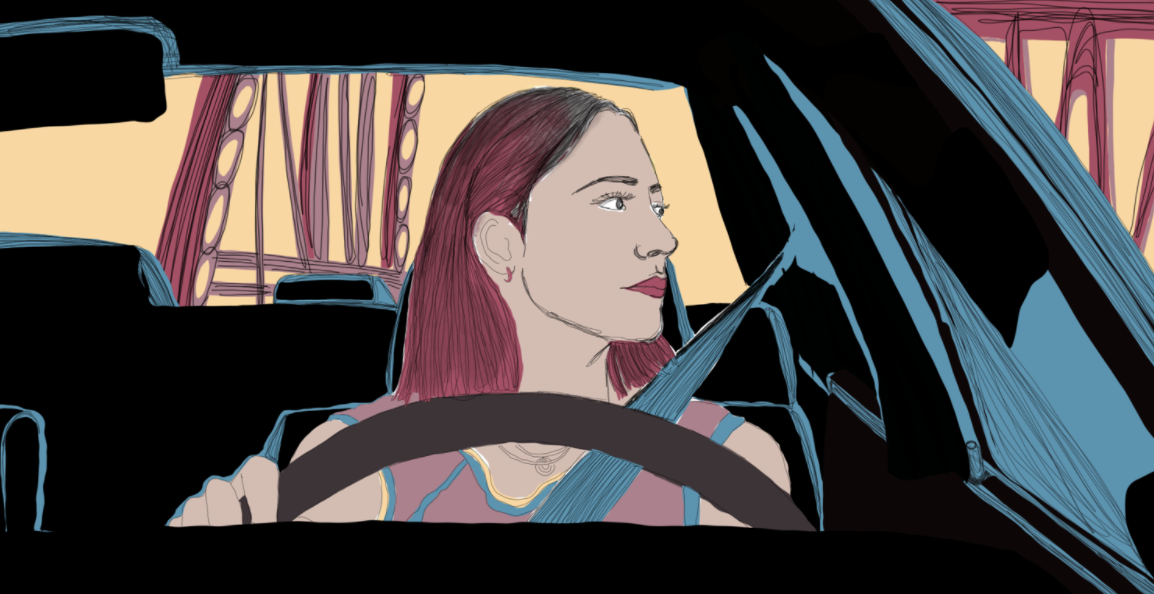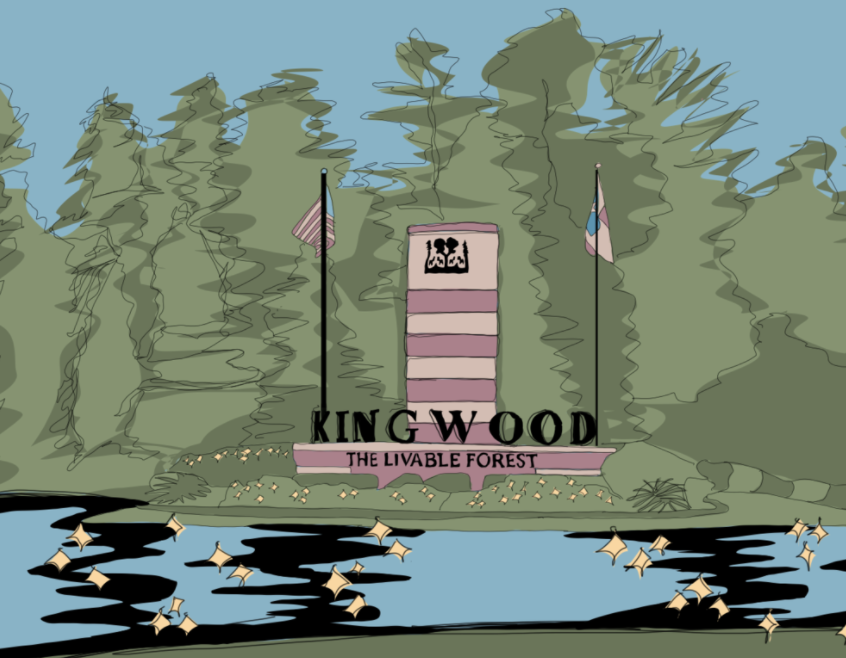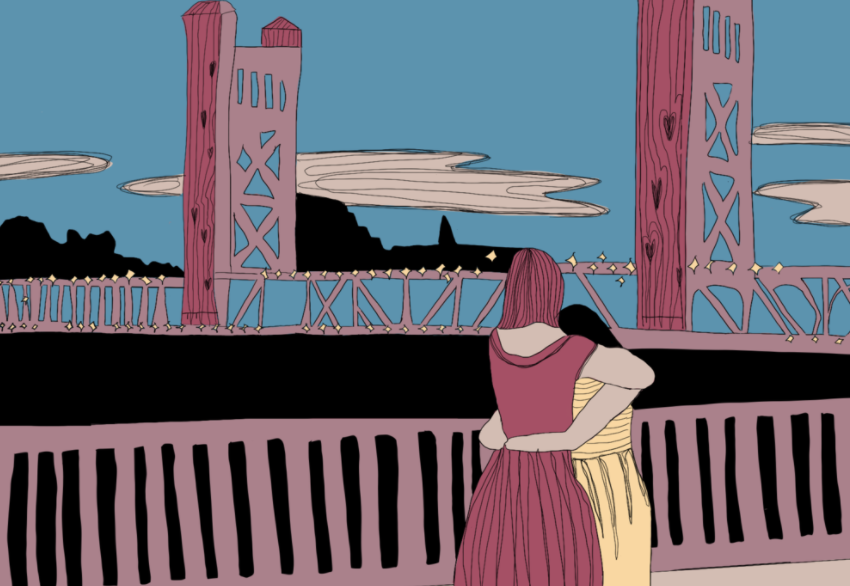Hometown Hate: Finding Peace in "Lady Bird"
October 29, 2021

Graphic by Amanda Garza
After hating my hometown for years, I rewatched “Lady Bird” and saw myself in the titular character—her bad qualities and all.
Sometimes, things take time to matter to you. I know they do for me. It’s only after the dust has finally settled that a sick, full-body sensation begins to creep up on me: regret.
It’s the kind of regret that burns my face: itchy and red-hot, poisoning me with an endless stream of self-hatred running down my throat. My mind suffers worse than my body somehow, and I’m tormented in the privacy of my own internal world—thousands of intrusive thoughts of how different my life could be take hold. I’m a child all over again: a ball of emotions without the ability to think or communicate my way out of my frustrations. I’m trapped. It’s much too long till I simmer down, and a wave of numbness seeps into my veins like morphine: better to be numb than to feel at all, right? I ask myself. I never get a reply.
Unmasking my deepest regret, it took 12 long years for my hometown to matter to me.
I grew up in Kingwood, Texas, an affluent suburb 23 miles Northeast of Houston. Infamously dubbed “The Bubble,” Kingwood was the East Texas safe haven for out-of-touch youth with millionaire parents. You were more likely to see a brand-new BMW or Mercedes driving along Kingwood Drive than you were to spot any car manufactured near the turn of the millennium. Most of the people were the same: white, wealthy, Republican.
While I grew up in Kingwood, I wasn’t born there. I hailed from the Golden State, in the city known as “America’s finest:” San Diego, California. For the first eight years of my life, I lived all across Southern California in places like San Diego, Temecula, and Murrieta. My early childhood was populated with bountiful sunshine, stoic, cascading mountains that surrounded me on all sides, and near-perfect weather year-round. Life was simple, and I was happy.
I wasn’t happy in Texas. I cried like a baby on the plane leaving California, an incidental moment of foreshadowing. At the time, Southern California and the Inland Empire was the only world I knew, and it was slipping through my inexperienced fingers. My pounding heart felt like it had ripped out of my tiny chest; I anxiously took my window seat, fidgeting and darting about profusely, hoping that the move was just a sick joke gone too far.

Texas, to me, was a land of cowboys, arid desert, and saloon doors. Kids there rode horses to class and spoke with an unintelligible Southern drawl, reminiscent of a bygone Confederate era. Of course, that wasn’t true, but the reality wasn’t exactly much better either.
The first time somebody spoke to me in Kingwood was on the first day of third grade, and my classmate shot up from his chair, waved his pointer finger accusingly at me, and said “Finally, somebody shorter than me!” That was the warm welcome my parents promised. My heart dropped, I don’t like it here, I thought—the first of many thoughts like that.
For the next 12 years, I did not become any more comfortable living in Kingwood, much to my mother’s disappointment. At every opportunity, I would dog on Kingwood. I scoffed at any of my friends that gave our “bubble” credit. Liking Kingwood was antithetical to me. Whenever I would go out or travel, I quietly reveled in the precious idea that people perceived me without sputtering that Kingwood label from their mouths. I’m from San Diego, but I live in Kingwood right now, I’d tell them, satisfied that I had successfully conned them into believing I was somebody I wanted to be.
When I was nearing my final days before moving to Austin, I was ready to leave Kingwood behind—that is, until I opened my laptop one night. Scouring the internet for movies to stream, one caught my eye: “Lady Bird.” My film-loving friends spoke highly of the movie, and while I had seen it before and even liked it, I was not paying full attention. I decided to give “Lady Bird” another chance—for my friends’ sake, I thought. Unknowingly, I was leaving a stage of my life that I had long identified with: hating my hometown.
Watching the film, I did not always like the titular character of Christine “Lady Bird” McPherson. She was brash, selfish, uncompromising, and ungrateful. Sure, she has good qualities, but she was not known for them—and the movie certainly did not assist in highlighting them. But as much as I didn’t like her, I couldn’t help but understand her. I knew where her anger was coming from; I saw that same fury in me too—an unrelenting, untameable beast of angst, always waiting to be set off.

I had never related to any character in my entire life as much as I did with Lady Bird—our relationships to our mothers, our hatred of our hometowns, our strong desire to leave and forget that any of it mattered at all—this relation shook me to my core. If I intimately identified with such a deeply flawed character, what does that make me? Just as flawed? Worse? Both were frightening ideas that painted me as the bad person I always feared I secretly was.
But I had to swallow that pill. Maybe—I struggled to even think about it—maybe I am ungrateful. Shame and embarrassment shifted around in my stomach, punishment for it taking me so painfully long to realize.
I took another look at Kingwood, through the eyes of my parents this time. I saw the lush greenery for what it was, not the confining forest I once imagined it as. I saw the quiet neighborhoods as a great place to raise a family, not a boring hellscape to direct my angst. I saw the people as neighbors I grew up around, not as strangers. Suddenly, it all made sense. I finally understood why my parents decided to raise us in Kingwood, 12 years after the fact: it was the right thing to do. At long last, I found peace with Kingwood, Texas.
While Kingwood is still not my favorite place in the world, I’ve realized that I don’t hate it anymore. Hometowns have a certain power over us, whether we like to admit it or not. There is no one word that can perfectly summarize our relationship with the place we matured in, except one: complicated.
Lady Bird captured that special, complicated hometown relationship, and it took me until watching Lady Bird to realize that for myself. I hope it does not have to take 12 years for someone else like me.■
Sometimes, things take time to matter to you. I know they do for me. It’s only after the dust has finally settled that a sick, full-body sensation begins to creep up on me: regret.
It’s the kind of regret that burns my face: itchy and red-hot, poisoning me with an endless stream of self-hatred running down my throat. My mind suffers worse than my body somehow, and I’m tormented in the privacy of my own internal world—thousands of intrusive thoughts of how different my life could be take hold. I’m a child all over again: a ball of emotions without the ability to think or communicate my way out of my frustrations. I’m trapped. It’s much too long till I simmer down, and a wave of numbness seeps into my veins like morphine: better to be numb than to feel at all, right? I ask myself. I never get a reply.
Unmasking my deepest regret, it took 12 long years for my hometown to matter to me.
I grew up in Kingwood, Texas, an affluent suburb 23 miles Northeast of Houston. Infamously dubbed “The Bubble,” Kingwood was the East Texas safe haven for out-of-touch youth with millionaire parents. You were more likely to see a brand-new BMW or Mercedes driving along Kingwood Drive than you were to spot any car manufactured near the turn of the millennium. Most of the people were the same: white, wealthy, Republican.
While I grew up in Kingwood, I wasn’t born there. I hailed from the Golden State, in the city known as “America’s finest:” San Diego, California. For the first eight years of my life, I lived all across Southern California in places like San Diego, Temecula, and Murrieta. My early childhood was populated with bountiful sunshine, stoic, cascading mountains that surrounded me on all sides, and near-perfect weather year-round. Life was simple, and I was happy.
I wasn’t happy in Texas. I cried like a baby on the plane leaving California, an incidental moment of foreshadowing. At the time, Southern California and the Inland Empire was the only world I knew, and it was slipping through my inexperienced fingers. My pounding heart felt like it had ripped out of my tiny chest; I anxiously took my window seat, fidgeting and darting about profusely, hoping that the move was just a sick joke gone too far.

Graphic by Amanda Garza
Texas, to me, was a land of cowboys, arid desert, and saloon doors. Kids there rode horses to class and spoke with an unintelligible Southern drawl, reminiscent of a bygone Confederate era. Of course, that wasn’t true, but the reality wasn’t exactly much better either.
The first time somebody spoke to me in Kingwood was on the first day of third grade, and my classmate shot up from his chair, waved his pointer finger accusingly at me, and said “Finally, somebody shorter than me!” That was the warm welcome my parents promised. My heart dropped, I don’t like it here, I thought—the first of many thoughts like that.
For the next 12 years, I did not become any more comfortable living in Kingwood, much to my mother’s disappointment. At every opportunity, I would dog on Kingwood. I scoffed at any of my friends that gave our “bubble” credit. Liking Kingwood was antithetical to me. Whenever I would go out or travel, I quietly reveled in the precious idea that people perceived me without sputtering that Kingwood label from their mouths. I’m from San Diego, but I live in Kingwood right now, I’d tell them, satisfied that I had successfully conned them into believing I was somebody I wanted to be.
When I was nearing my final days before moving to Austin, I was ready to leave Kingwood behind—that is, until I opened my laptop one night. Scouring the internet for movies to stream, one caught my eye: “Lady Bird.” My film-loving friends spoke highly of the movie, and while I had seen it before and even liked it, I was not paying full attention. I decided to give “Lady Bird” another chance—for my friends’ sake, I thought. Unknowingly, I was leaving a stage of my life that I had long identified with: hating my hometown.
Watching the film, I did not always like the titular character of Christine “Lady Bird” McPherson. She was brash, selfish, uncompromising, and ungrateful. Sure, she has good qualities, but she was not known for them—and the movie certainly did not assist in highlighting them. But as much as I didn’t like her, I couldn’t help but understand her. I knew where her anger was coming from; I saw that same fury in me too—an unrelenting, untameable beast of angst, always waiting to be set off.

Graphic by Amanda Garza
I had never related to any character in my entire life as much as I did with Lady Bird—our relationships to our mothers, our hatred of our hometowns, our strong desire to leave and forget that any of it mattered at all—this relation shook me to my core. If I intimately identified with such a deeply flawed character, what does that make me? Just as flawed? Worse? Both were frightening ideas that painted me as the bad person I always feared I secretly was.
But I had to swallow that pill. Maybe—I struggled to even think about it—maybe I am ungrateful. Shame and embarrassment shifted around in my stomach, punishment for it taking me so painfully long to realize.
I took another look at Kingwood, through the eyes of my parents this time. I saw the lush greenery for what it was, not the confining forest I once imagined it as. I saw the quiet neighborhoods as a great place to raise a family, not a boring hellscape to direct my angst. I saw the people as neighbors I grew up around, not as strangers. Suddenly, it all made sense. I finally understood why my parents decided to raise us in Kingwood, 12 years after the fact: it was the right thing to do. At long last, I found peace with Kingwood, Texas.
While Kingwood is still not my favorite place in the world, I’ve realized that I don’t hate it anymore. Hometowns have a certain power over us, whether we like to admit it or not. There is no one word that can perfectly summarize our relationship with the place we matured in, except one: complicated.
Lady Bird captured that special, complicated hometown relationship, and it took me until watching Lady Bird to realize that for myself. I hope it does not have to take 12 years for someone else like me.■
Other Stories in Culture
© 2025 SPARK. All Rights Reserved.
